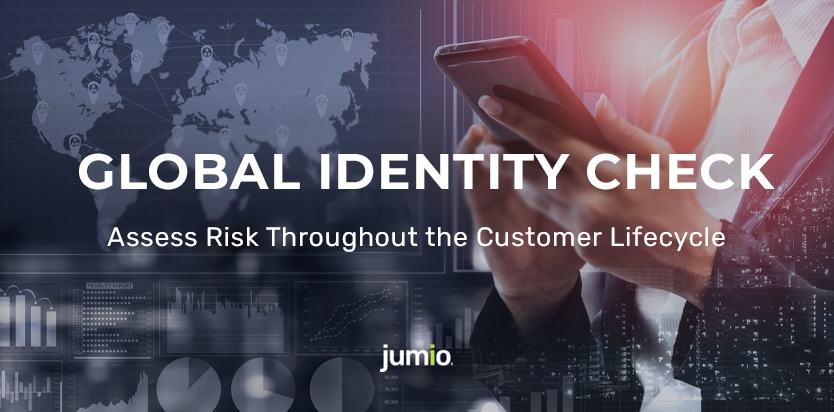
For your online business to succeed, it’s essential that fraudsters fail to get onto your platform. That’s why Jumio provides solutions that help businesses to know and trust their users throughout the customer lifecycle. Risk signals are a powerful tool for assessing the risk of a user right from the start and for customizing the onboarding workflow for each individual based on the results. But they can also be valuable for assessing the risk of existing customers. In this blog, we’ll take a look at how the Global Identity Check risk signal does both.
What is Global Identity Check?
Global Identity Check is a lightweight risk signal that checks the user’s name, email, phone number and address against dozens of databases in a global network to assess risk. It answers a few key questions, including:
- Do the email, phone number and address seem to be valid?
- Do the name, email, phone number and address go together, or does it appear that one of these data points is being used by a fraudster?
- How often have these data points been seen recently on credit applications and other onboarding requests? Does the amount of traffic seem correct for a legitimate user or does it indicate fraud?
Digital Trust Throughout the Customer Journey
How to Leverage the Jumio KYX Platform from Onboarding to Ongoing Monitoring
Customizing the Onboarding Journey
By running the user’s information through Global Identity Check, you can determine up front whether this person needs further scrutiny before you run more expensive checks.
For example, if your business has relatively low security needs, you might only prompt the user to scan their ID and selfie if the result came back as moderate or high risk. Conversely, if your business has higher security requirements, you might stop the workflow completely and not run ID verification or an expensive credit report if their Global Identity Check result is above a certain threshold.
Because Global Identity Check is lightweight and checks multiple data points at once, it’s ideal for assessing risk near the beginning of the user journey, typically right after or in parallel with Device Risk. Based on the results, you could then do a more detailed analysis if necessary using the Phone Number Risk, Email Risk and Address Services risk signals. This approach provides the least friction for your legitimate users, creating the best user experience possible, while saving money for your business.
Ongoing Monitoring
Global Identity Check is also useful for running periodically on existing customers. For example, if a customer is about to make a large payment, or the payment is going to a certain jurisdiction, you might want to run Global Identity Check again to see if the customer’s risk has changed, which could indicate that their identity has been stolen or their accounts have been taken over by a fraudster.
In summary, the Global Identity Check risk signal is a lightweight but powerful risk signal that can help you keep your platform safe throughout the customer lifecycle. To learn more about Jumio’s risk signals and the best approach for protecting your business, just fill out this form and one of our specialists will contact you to start a conversation.

